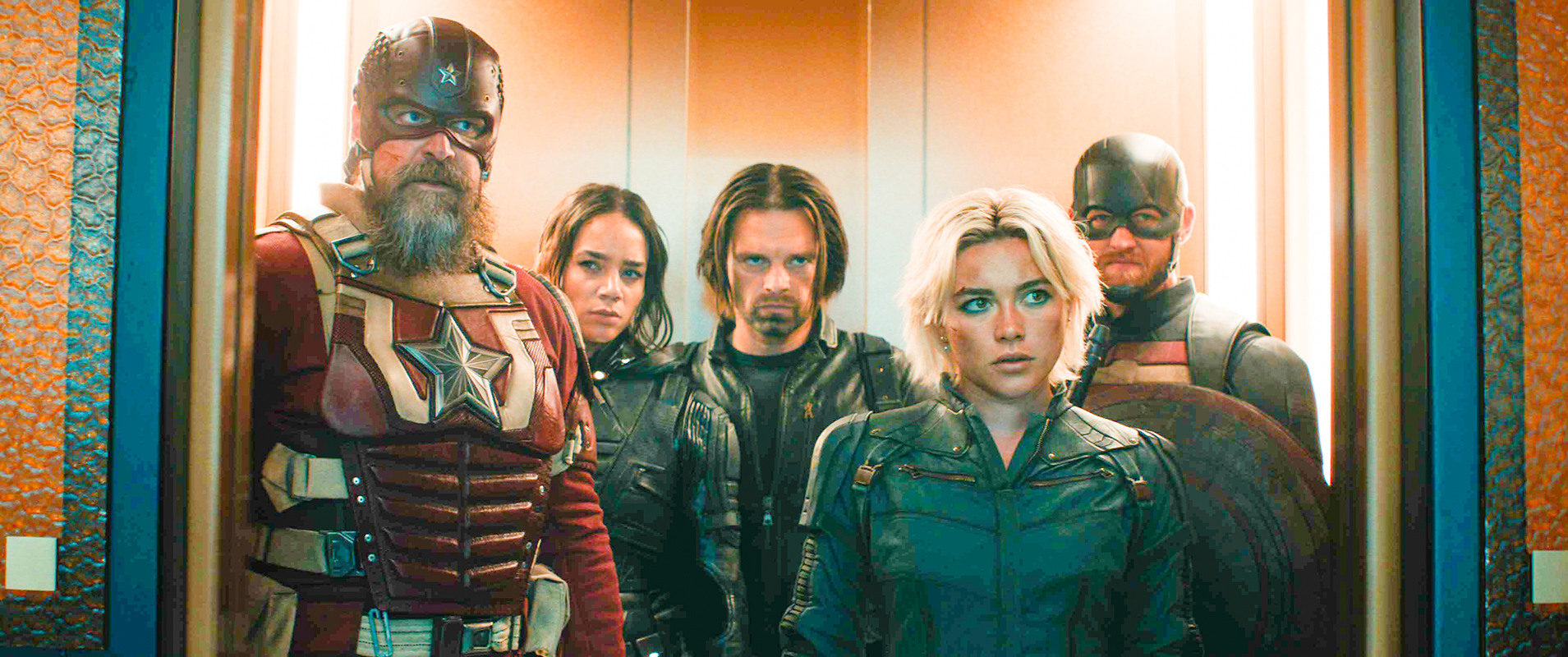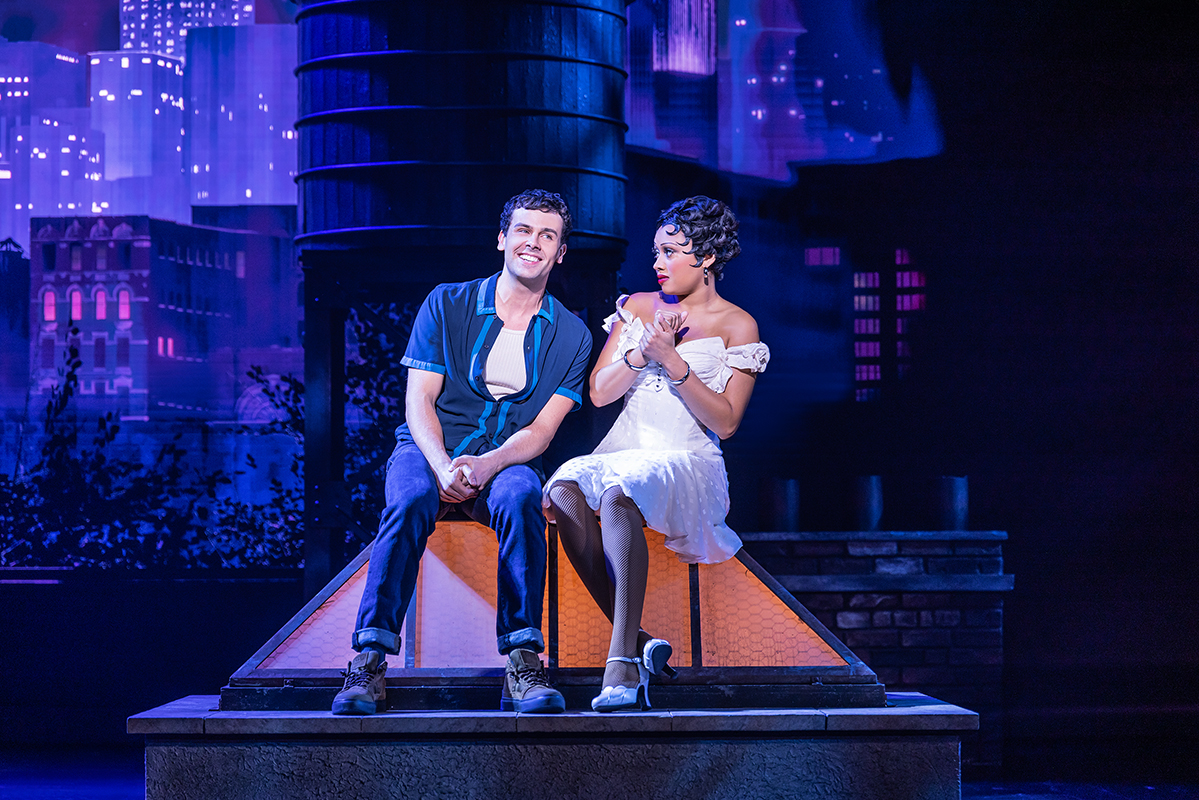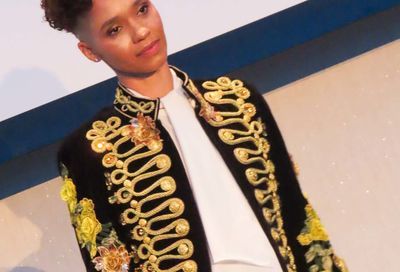‘Carmen’ Review: Lost Angels
Reimagining the classic tale as a modern cross-border romance, Benjamin Millepied's 'Carmen' dances to its own sensuous beat.
By André Hereford on May 7, 2023 @here4andre

The heroine of director-choreographer Benjamin Millepied’s Carmen (★★★☆☆) isn’t the wanton temptress of Bizet’s classic opera. Portrayed by Scream queen Melissa Barrera, this raven-haired Carmen might put a bullet in a man if she has to, but that’s because she’s a survivor, not a betrayer.
In fact, her journey in this dance- and music-driven drama begins with a warning from her late mother, voiced from the beyond, that men are not to be trusted.
All men, or just one man, madre says, it’s all the same: they yearn for the tears, milk, and blood of womanhood. Mother makes a rock-solid point, borne out by the succession of hungry, violent men hounding Carmen’s path from Mexico to Los Angeles.
Traveling on foot with a group of migrants trekking north to the U.S. border through the Chihuahuan Desert, Carmen fatefully runs into one violent man, though, whose heart, contrary to her mother’s warning, appears to pump blood, not sand.
Ex-Marine Aidan, embodied by Aftersun Oscar nominee Paul Mescal as still waters running deeper than we can know, is introduced working out his boxing moves on a heavy bag hung from a carport. He’s hungry, but held back by post-combat trauma he can’t express.
Hoping to jog his spirit, and his bank account, his sister Julieanne (Nicole da Silva) hooks Aidan up with the local civilian Border Patrol, whose trigger-happy leader incites the deadly gunfight that throws Aidan and Carmen together, on the run from her enemies, his enemies, and the law.

The first feature film from Millepied — former dance director of the Paris Opera Ballet, and choreographer of Black Swan — adapts Prosper Mérimée’s novella Carmen and its inspiration, The Gypsies, a narrative poem by Alexander Pushkin, into a rapturous visual ballet, blending dialogue, music by the brilliant Nicholas Britell (Moonlight), a few original songs, and dance.
Mescal, flattening his natural brogue into a flat, indiscernible American accent, sings and strums a sweetly sad ballad, laying Aidan’s open heart on the line.
Barrera, who, before she was dodging Ghostface, was high-kicking through the streets of Uptown Manhattan in In the Heights, serenades a fearful young migrant with a haunting melody, and later, performs a gorgeously-sung lament of impossible love.
The singing gives way to a luscious tango partnering Carmen with a handsome dancer from the enigmatic dive run by her godmother Masilda, played by the one and only Rossy de Palma, who delivers a typically impassioned, soulful turn.
The presence of Pedro Almodóvar’s illustrious muse signals, along with touches of magical realism, and the expressive costumes and choreography, the film’s bent towards artsy eccentricity, despite the ripped-from-the-headlines premise of a fatal standoff between migrants and a border patrol.

Millepied, with screenwriters Alexander Dinelaris and Loïc Barrère, has concocted a fable, not a screed or exposé, but a fairy-tale romance set in the iconic American West. Cinematographer Jörg Widmer shoots ribbons of highway laced through fields of golden grasses under bright blue skies with a foreigner’s fascination for the earthy palette and harsh terrain.
Carmen and Aidan hit the road in an ’88 Chevy pickup chased by muscle cars. In a different era, they’d be puffing clouds of Marlboros, too.
The pair generates plenty of heat in a sexy moonlit dance duet, and a brief love scene that unfolds like a tempestuous pas de deux. Barrera and Mescal’s obvious physical chemistry, however, can’t disguise that the film expends little effort, story-wise, shoring up their attraction beyond necessity in a hectic moment, and plain lust. They’re both two decent-seeming people, yet, ultimately, those still waters don’t run that deep.
But the view is gorgeous. Throughout, Widmer keeps the camera in smooth motion in sync with the action, be it acts of violence, or of rhythm and romance.
Millepied keeps the styles of music and choreography varied, taking us from Romani-inspired flamenco to a hip-hop-inflected boxing match dance number that plays like Stomp meets Fight Club. Dense with the atmosphere of desire, danger, and minor-key melancholy, it’s the world the film creates, more than the romance inside it, that seduces and wins the heart.
Carmen is playing in select theaters, including Landmark’s E Street Cinemas. Visit www.landmarktheatres.com or www.fandango.com.
‘Egghead & Twinkie’ Is A Colorful Queer Road Trip
The queer coming-of-age comedy "Egghead & Twinkie" gains much of its quirky appeal from a kicky soundtrack and cool animation.
By André Hereford on April 26, 2025 @here4andre
Her parents call her Vivian, but she won't stand for anyone else calling her that. She's Twinkie, a 17-year-old, self-described "master of sarcasm" just poking her head out of the closet in writer-director Sarah Kambe Holland's engaging autobiographical debut feature, Egghead & Twinkie.
Based on Holland's eponymous 2019 short, the feature re-teams Sabrina Jie-A-Fa as baby dyke Twinkie and Louis Tomeo as straight dude Egghead, Twinkie's best friend since fourth grade, when his family moved in across the street.
Now the pair are wading into their last summer together in the Florida burbs before Egghead heads to Stanford to study engineering, leaving Twinkie at home still figuring herself out. She's already figured out that she doesn't want to be like her conservative, yet separated, adoptive Mom (Kelley Mauro) and Dad (J. Scott Browning).
‘Thunderbolts*’ is a Solid Return to Form for the MCU
Marvel serves up a "Very Special Episode" of their superhero franchise with the morally ambitious "Thunderbolts*."
By André Hereford on May 2, 2025 @here4andre
All superheroes are not created equal. Some wield the might of titans, defying physics with their fantastic abilities and godlike powers over the elements. Others "just punch and shoot," as former Black Widow assassin, Yelena Belova, shrewdly observes taking stock of the crew she finds herself assembled with in Marvel's anti-hero team-up Thunderbolts*.
She's talking about super-soldiers Red Guardian (David Harbour), John Walker (Wyatt Russell), and Bucky Barnes (Sebastian Stan), physical matter phaser Ghost (Hannah John-Kamen), and fellow assassin Taskmaster (Olga Kurylenko).
‘Boop! The Musical’ Is Broadway’s Happiest Surprise
Jasmine Amy Rogers makes a confident and dynamic Broadway debut in this vibrant revival of a timeless cartoon icon.
By Ryan Leeds on April 20, 2025
Theater suggestions are part of a critic's job. So when a friend sent a text asking for a recommendation to take his visiting mom to -- "something joyful" on Broadway was the requirement -- I didn't waste a moment responding: Boop! The Musical.
It may seem a surprising answer because the property upon which it's based comes from a cartoon that was popular from 1930 to 1939. Nevertheless, Betty Boop has endured, accumulating legions of cross generational fans and becoming one of the most globally recognized animated figures of all time.
Director and choreographer Jerry Mitchell, who has a knack for leaving audiences on a natural high after all his shows, once again brings literal glitter to a work that makes us long for the days when nearly every old-fashioned musical delivered big thrills.
Support Metro Weekly’s Journalism
These are challenging times for news organizations. And yet it’s crucial we stay active and provide vital resources and information to both our local readers and the world. So won’t you please take a moment and consider supporting Metro Weekly with a membership? For as little as $5 a month, you can help ensure Metro Weekly magazine and MetroWeekly.com remain free, viable resources as we provide the best, most diverse, culturally-resonant LGBTQ coverage in both the D.C. region and around the world. Memberships come with exclusive perks and discounts, your own personal digital delivery of each week’s magazine (and an archive), access to our Member's Lounge when it launches this fall, and exclusive members-only items like Metro Weekly Membership Mugs and Tote Bags! Check out all our membership levels here and please join us today!
The Magazine
-
Most Popular
 D.C. Opens Its First LGBTQ Senior Housing Community
D.C. Opens Its First LGBTQ Senior Housing Community  Virginia Lt. Gov. Condemns Gay Marriage in Handwritten Note
Virginia Lt. Gov. Condemns Gay Marriage in Handwritten Note  Police Raid Pittsburgh Gay Bar, Forcing Patrons Into Rain
Police Raid Pittsburgh Gay Bar, Forcing Patrons Into Rain  Help Us Choose Our Next "From the Archives" Interview!
Help Us Choose Our Next "From the Archives" Interview!  Eurovision Bans Pride and Trans Flags
Eurovision Bans Pride and Trans Flags  Win Tickets to Grace Jones & Janelle Monáe at The Anthem
Win Tickets to Grace Jones & Janelle Monáe at The Anthem  Gallery: Blake Little's Breathtaking 'Construction Nudes'
Gallery: Blake Little's Breathtaking 'Construction Nudes'  Military Ban on Trans Americans Reinstated by Supreme Court
Military Ban on Trans Americans Reinstated by Supreme Court  "Senate Twink" Says Video Sex Scandal Drove Him to Flee U.S.
"Senate Twink" Says Video Sex Scandal Drove Him to Flee U.S.  GALA’s 'Choke' Confronts Loyalty and Love in a Polluted World
GALA’s 'Choke' Confronts Loyalty and Love in a Polluted World
 Virginia Lt. Gov. Condemns Gay Marriage in Handwritten Note
Virginia Lt. Gov. Condemns Gay Marriage in Handwritten Note  D.C. Opens Its First LGBTQ Senior Housing Community
D.C. Opens Its First LGBTQ Senior Housing Community  Military Ban on Trans Americans Reinstated by Supreme Court
Military Ban on Trans Americans Reinstated by Supreme Court  Lady Gaga Concert in Rio Was Target of Foiled Bomb Plot
Lady Gaga Concert in Rio Was Target of Foiled Bomb Plot  Tennessee Lets Doctors Deny Treatment on Moral Grounds
Tennessee Lets Doctors Deny Treatment on Moral Grounds  Help Us Choose Our Next "From the Archives" Interview!
Help Us Choose Our Next "From the Archives" Interview!  Critics Say HHS Report Pushes Conversion Tactics
Critics Say HHS Report Pushes Conversion Tactics  Police Raid Pittsburgh Gay Bar, Forcing Patrons Into Rain
Police Raid Pittsburgh Gay Bar, Forcing Patrons Into Rain  Bisexual Pop Singer Jill Sobule Left a Lasting Queer Legacy
Bisexual Pop Singer Jill Sobule Left a Lasting Queer Legacy  A Spectacular Upgrade for DC's LGBTQ+ Community Center
A Spectacular Upgrade for DC's LGBTQ+ Community Center
Scene
Metro Weekly
Washington's LGBTQ Magazine
P.O. Box 11559
Washington, DC 20008 (202) 638-6830
About Us pageFollow Us:
· Facebook
· Twitter
· Flipboard
· YouTube
· Instagram
· RSS News | RSS SceneArchives
Copyright ©2024 Jansi LLC.









You must be logged in to post a comment.